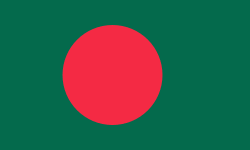Bangladeshi taka
৳
The Bangladeshi taka (টাকা, sign: ৳, code: BDT, short form: Tk) is the currency of the People's Republic of Bangladesh. In Unicode, it is encoded at.Issuance of bank notes ৳10 and larger is controlled by Bangladesh Bank, while the ৳2 and ৳5 banknotes are the responsibility of the ministry of finance of the government of Bangladesh. The banknotes of Tk. 2 and Tk.5 have mostly been replaced by coins while lower denomination coins (including all poysha coins) up to Tk. 1 have almost gone out of circulation due to inflation. The most commonly used symbol for the taka is "৳" and "Tk", used on receipts while purchasing goods and services. It was formerly divided into 100 poysha, but poysha coins are no longer in circulation.
According to The American Heritage Dictionary of the English Language and Banglapedia, the word taka came from the Sanskrit word tankah. The word taka in Bangla is also commonly used generically to mean any money, currency, or notes. Thus, colloquially, a person speaking in Bangla may use "taka" to refer to money regardless of what currency it is denominated in. This is also common in the Indian states of West Bengal and Tripura, where the official name of the Indian rupees is "taka" as well. In other eastern Indian languages with the influence of Prakrit in Bihar it is "taka" in Maithili and Magadhi languages, in Assam it is টকা tôka and it is ଟଙ୍କା taṅkā in Odisha.
Country
-
Bangladesh
Chittagong, the second-largest city, is the busiest port on the Bay of Bengal.
The official language is Bengali, one of the easternmost branches of the Indo-European language family.
